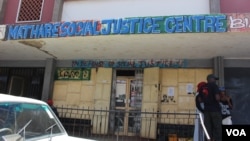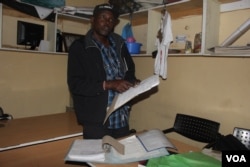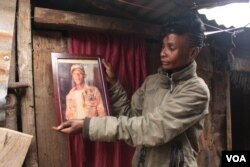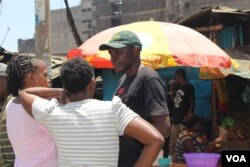Brothers Victor and Benard Okoth were in their early twenties when they were killed on August 9, during unrest sparked by results of the Kenya presidential run-off.
The death toll from election-related violence last year topped 100, according to findings released by Human Rights Watch. HRW and other rights groups say most of the victims were killed by police. The families of those killed are demanding justice but say they don't know if their calls are being heard.
Benna Buluma, the mother of Victor and Benard Okoth, remembers the day her sons died.
Because of the tensions, she said, speaking through a translator, people were stockpiling food so I woke up early to get some vegetables. Victor walked in and left his baby with me. Benard was just from his house. Then I heard them saying they were going to the main road. Police were already throwing tear gas.
The family lives in Mathare, an informal settlement outside Nairobi where most people support the opposition.
There were gun shots, Benna said. I never thought it would ever be my children. It was Benard that I saw first.
Benna said she lay on his body until it was taken away by the police. She later found Victor at the morgue. She said she saw bullet holes in both her sons.
VOA met Benna on the steps of the Mathare Social Justice Center, where she had come to check on her sons’ case.
Activist Kennedy Chindi works at the center, documenting and reporting police abuses.
“During the elections, we documented 19 deaths in Mathare," Chindi said. "The extrajudicial executions, they become more rampant during elections because the police take advantage."
The center says police gunned down 805 youth in Mathare and the surrounding area between 2013 and 2015. Most of the victims were young men aged 13 to 20.
Mathare resident Sarah Wangari said police gunned down her son as he walked home with four friends on November 18 of last year.
It pains me because this was a 19-year-old, and these were six police officers, said Wangari, speaking through a translator. Was it so hard to take him to a police station if he had done something wrong?
She said his body was riddled with 10 bullet holes. With Chindi's help, she is disputing the official police report that said the young men were thieves and that her son had a gun.
Benna recently provided testimony about the killing of her two sons to the Independent Police Oversight Authority (IPOA), the government body tasked with investigating police abuses. She wants whoever shot her sons to answer for murder.
"IPOA got 63 cases between August and October election period, and we are at various stages of looking into those cases, investigating those cases," said Dennis Oketch, the head of communications at IPOA. "So far, we have terminated or closed at least two of those cases which we recommended to the director of public prosecutions.”
In those two cases, IPOA established that police clobbered a 6-month-old baby to death in her parents' house in Kisumu, and that a 9-year-old was shot by police while on a balcony of her family’s house in Mathare. But IPOA said it could not determine the specific officers that were involved.
Oketch said investigations into other killings during the electoral period are at the advanced stages.
"A good number of the around 20 are undergoing internal legal review, and after legal review we will be advancing them to the attention of the director of Public Prosecution," Oketch said.
But the families of the victims have their doubts.
Oketch told VOA that since IPOA was created in 2013, it has successfully completed 640 investigations. However, critics say IPOA’s recommendations rarely lead to consequences for the police accused of abuses.
On March 9, President Uhuru Kenyatta and opposition leader Raila Odinga grasped hands and said they would work out their differences in the interest of the country. It was unexpected after the long and bitterly contentious election period.
Benna worries her sons will be forgotten.
“What kind of friendship is that?" she asked. "The first thing they would have said is that they want to talk about the loss of lives during the election period because people were killed and they know that many people were killed in different areas."
Chindi, the activist in Mathare, says political reconciliation is impossible without justice.
“There is so much worry among the victims and survivors, mostly of police extrajudicial executions, because most of them right now fail to understand how their fate will be," Chindi said, "because the two principals have come together and they are now forming some committees without putting in the interest of the victims and survivors…Now they are negotiating, the two of them, without the interest of those who died for their cause.”
He says the center will continue its work in Mathare, seeking justice for victims and their families.










